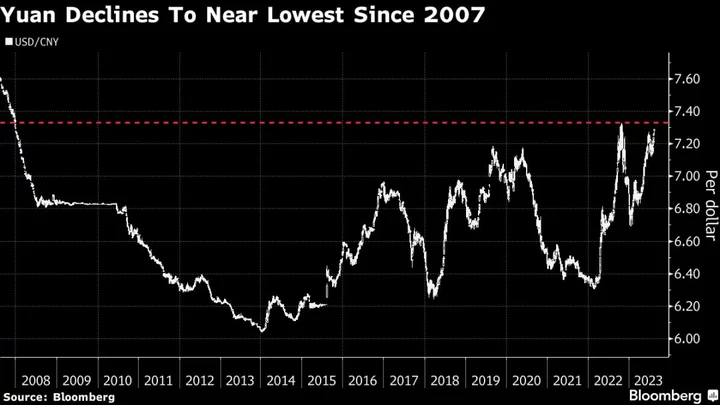The People’s Bank of China is treading a fine line as it looks to bolster the economy without unleashing faster capital outflows by making the yuan too weak.
The currency is on the brink of dropping to a 16-year low against the dollar following the central bank’s unexpected interest-rate cut Tuesday. With the Federal Reserve still tightening policy to tame inflation, the yield gap between 10-year US and Chinese government bonds is at the widest since 2007. That’s helping fuel outflows as local investors look for higher yields overseas.
“China’s monetary policymakers have a balancing act to execute: supporting a domestic economy through lower interest rates without causing capital outflows,” said David Chao, a global market strategist for Asia Pacific ex-Japan at Invesco Asset Management in Singapore.
With slowing growth in consumer spending, industrial output and investment, the rate cut suggests policymakers are growing increasing concerned about the deteriorating outlook. Another major property developer now faces a debt crisis and home sales continue to decline. Contagion worries are also spreading to the financial sector.
The PBOC is tasked with keeping the currency stable while aiming to boost the economy — two ambitions that can often be in conflict. A weak yuan may damp the appeal of China assets to overseas investors, while Chinese firms may be reluctant to convert foreign currencies into yuan given the yield differential.
The onshore yuan closed at 7.2899 per dollar Tuesday, having dropped 5.3% this year. A slide past 7.3280 would put the currency at the weakest since December 2007.
Stronger Fixing
That concern was signaled by the PBOC’s decision Tuesday to set a stronger-than-expected daily reference rate for the yuan — around which the currency is allowed to move 2%. Traders betting against the yuan will also be on alert for further dollar sales by state-owned banks to help prop up the currency. Other tools in reserve includes selling dollars, or adding punitive costs to shorting yuan in forward markets.
Bearish sentiment toward the yuan has intensified in the options market, with one-month dollar-yuan implied volatility offshore hovering around the highest since April. The onshore yuan also traded closer to the weak end of its trading limit defined by the daily reference rate. These are further signs that if any policy actions to support the yuan aren’t delivered quickly, bearish wagers could be buoyed further.

